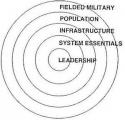There's a certain paradox here, however. Just at the local population may be resentful of external attempts to impose a certain (Western) model of governance, they may be equally resentful of an apparent double standard whereby the West fails to hold local clients and allies to broader human rights and governance norms.
Let's take Egypt as an example. While the Mubarak regime certainly receives substantial foreign aid, in no way can the current system of governance be considered a foreign imposition. Rather, it has an evolutionary authoritarian lineage stretching back to the 1952 coup against the (pro-Western) monarchy. US development aid and FMA (totaling around $1.5 billion a year) is only around 1% of GDP--helpful, but certainly not critical, to regime survival.
What is the "local ruler" to be used in measuring this case? How do we know? If we press Mubarak hard for reform, are we imposing alien values on an indigenously-developed political system? Or are we supporting the local population?
Many of the local elites will argue that you need to use a Middle Eastern ruler--and that a moderate authoritarian Mubarak government is better than the chaos that would follow any efforts at full-scale democratization. Don't rock the boat, they'll say--let us evolve on our own.
Conversely, much of the public, and most human rights and reforms advocates, complain that the US isn't rocking the boat enough. They complain that universal human rights norms aren't being applied in the Egyptian case, and argue that the West is being hypocritical in failing to press Egypt harder. Polls suggest that--contrary to elite opinion--the vast majority of Egyptians want a democratic politic system of some sort.
This is not to say that Western reform efforts don't involve a great deal of ethnocentrism--they do. Indeed, they often betray a remarkable ignorance of our own political evolution (case in point: most Western countries weren't properly democratic, in terms of enfranchising the female half of the population, until the early or even mid-20th century). On the other hand, how do we avoid the moral relativism of accepting "local" governance solutions that themselves may be repressive or unpopular, or allowing ourselves to manipulated by authoritarian elites who use supposed cultural values to defend their own narrow political and economic interests?







 ! Of course, tribal constructs, corporations and other options for governance tend not to be recognized as "valid" within the post-Westphalian model, which is where a lot of the problems come from.
! Of course, tribal constructs, corporations and other options for governance tend not to be recognized as "valid" within the post-Westphalian model, which is where a lot of the problems come from. ) end state.
) end state.
 except in some politicians mind.... The System is not failing it is "changing" often violently, which can be a really big problem for the larger system it connects to. When we begin to understand that we may start making some headway. It's like Bob said all countries (live political systems) are in various sates of Insurgency(change) the degree of that change and the method used to cause the change will often determine if we will intervene or not.
except in some politicians mind.... The System is not failing it is "changing" often violently, which can be a really big problem for the larger system it connects to. When we begin to understand that we may start making some headway. It's like Bob said all countries (live political systems) are in various sates of Insurgency(change) the degree of that change and the method used to cause the change will often determine if we will intervene or not.

Bookmarks